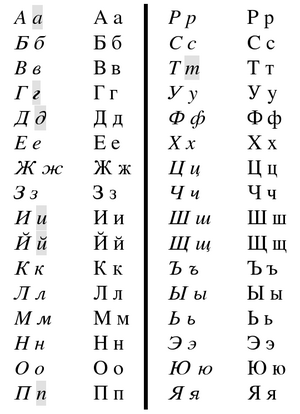Cyrillic alphabet facts for kids
| This article contains Cyrillic text. Without the correct software, you may see question marks or boxes, misplaced vowels or missing conjuncts instead of Cyrillic letters. |
The Cyrillic alphabet is a special way of writing that comes from the Slavic people. Today, many languages use it. These include Russian, Ukrainian, Belarusian, Bulgarian, and Macedonian. It is also used for most South Slavic languages. This alphabet was created in the First Bulgarian Empire around the 10th century. Later, the Soviet Union made many non-Slavic languages in places like the Caucasus, Siberia, and Central Asia use Cyrillic too.
How the Cyrillic Alphabet Began
The first language of the Slavic people was called Old Church Slavonic. This language was important for the Russian Orthodox Church. In the 800s, two monks named St. Cyril and Methodius traveled to Eastern Europe. They wanted to teach the Slavic people about Christianity. To do this, they created an early version of the Cyrillic alphabet, which was based on the Glagolitic alphabet.
Over time, the alphabet changed. In the 18th century, a writer named Nikolay Karamzin added three new letters: Э, Й, and Ё. In 1708, Peter the Great, who was the ruler of Russia, made an important change. He added smaller, lowercase versions of the letters we use today.
More recently, some countries decided to change their writing system. In 1991, Azerbaijan, Turkmenistan, and Uzbekistan stopped using the Cyrillic alphabet. They chose to use the Latin alphabet instead.
Related Writing Systems
Images for kids
-
Cyrillic Script Monument in Antarctica
-
A page from Азбука (Букварь) (ABC (Reader)), the first Russian language textbook, printed by Ivan Fyodorov in 1574. This page features the Cyrillic alphabet.
See also
 In Spanish: Alfabeto cirílico para niños
In Spanish: Alfabeto cirílico para niños
 | Frances Mary Albrier |
 | Whitney Young |
 | Muhammad Ali |







